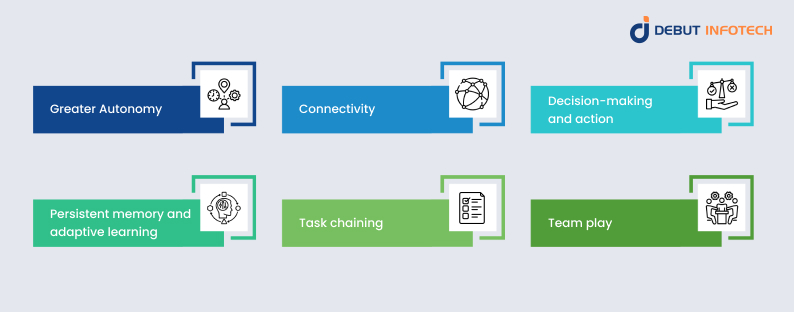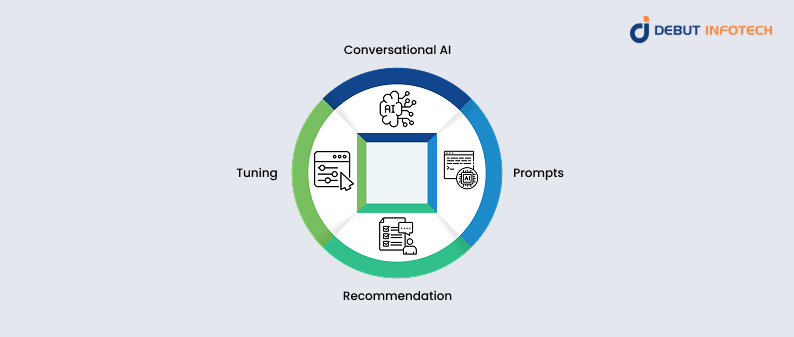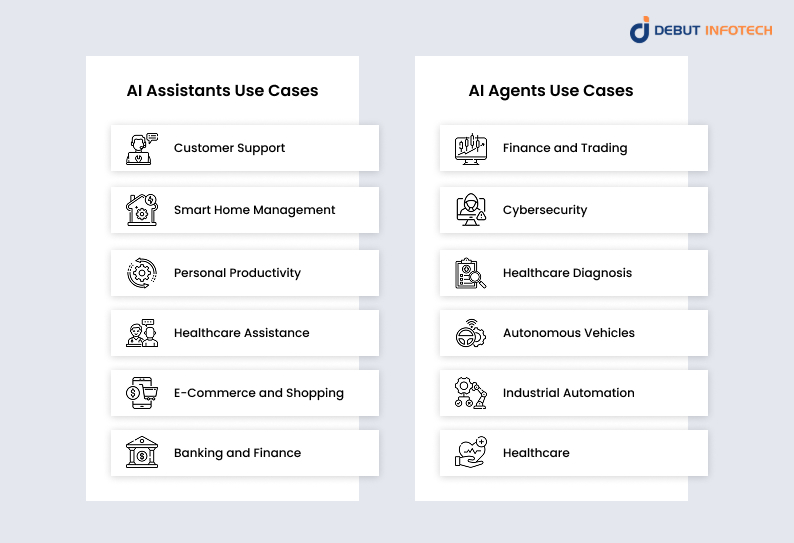Table of Contents
Home / Blog / AI/ML
AI Agents Vs AI Assistants: All You Need To Know
March 27, 2025

March 27, 2025
The development of artificial intelligence technology has transformed the way businesses and their customers interact with technology. The developing AI context features a crucial debate about the distinctions between AI agents vs AI assistants, although these tools belong to similar AI categories. The tools function differently because they share similar goals to increase productivity and optimize tasks and decision processes. Businesses and developers need to understand AI agent development alongside differences in functional purposes because this creates the foundations for effective AI utilization.
AI programs have progressed through multiple stages to become advanced autonomous systems that can now make their own decisions. AI agents undertake individual problem-solving tasks as part of their design, but AI assistants provide assistance through dialog and user interaction. The article examines the historical evolution and progressive development of AI agents and AI assistants, followed by their functionality comparisons and industry-wide effects.
Ready to Integrate AI into Your Business?
Whether you need an AI assistant or an AI agent, Debut Infotech can help you build the right solution. Our expert developers specialize in AI development services to create intelligent, efficient, scalable AI systems.
What Are AI Agents?
AI agents represent autonomous systems that execute programs without human supervision. These programs evaluate data and perform automated functions through specific machine-learning protocols and pre-established rules. AI agents perform essential tasks across finance and healthcare sectors and cybersecurity domains because decision automation and decision-making remain vital in these industries.
The Evolution of AI Agents
Artificial intelligence agents have developed over multiple decades, starting from basic rule-driven applications and being transformed into modern autonomous systems. Artificial intelligence adopted its initial algorithms through programmed rules, which enabled simple automated decision-making from specified input data. Such early systems showed restricted capabilities because they could not generate new knowledge from unexpected information or respond to modifications.
AI agents have gained better intelligence capabilities through advances in AI development services. Modern AI agents access large datasets using machine, deep, and reinforcement learning to generate automatic predictions and perform actions without human supervision. The new advancement in AI technology has enabled the creation of AI Copilot systems, which help users with decision-making through automated complex work systems.
The Role of AI Agents Today
AI agents operate throughout multiple sectors, such as finance and healthcare, while deployed within automation systems. Real-time processing capacity enables them to work with big data and detect essential patterns while carrying out tasks from real-time information. Autonomous operation differentiates AI agents from the function of AI assistants who mainly deliver support services alone.
Companies constructing AI agents use these intelligent bots to create trading machines that study market patterns to finish transactions through automated processes. The medical examination of records by AI agents leads to disease diagnoses followed by treatment recommendations for healthcare. These advanced systems showcase the future of AI agents, where decision-making is faster, more accurate, and less reliant on human oversight.
Key Features of AI Agents

- Greater Autonomy:
AI agents follow an initial activation sequence to work autonomously, decreasing dependency on human guidance during the entire process. AI agents implement multi-component autonomy to reason and problem-solve independently through external data sets and tools, while assistants need user approval for their proposed actions. Their ability to function beyond a basic chat-based system allows them to autonomously learn and make proactive choices, saving staff time while independently processing complex work requirements. Reasoning abilities within the newest AI models continue to evolve to align with this requirement.
- Connectivity:
AI agents unify various capabilities into a single workflow, eliminating bottlenecks that arise from disconnected systems. Integrating seamlessly with external applications, data sources, and other AI models enhances productivity, reducing friction between process components.
- Decision-making and action:
Using tools by command does not qualify an LLM as an agent. Through autonomous functionality, AI agents take control of choosing suitable tools and timing their implementation. Foundation models form the basis for AI agents, enabling autonomous task completion toward set goals and initiating additional information retrieval from beyond foundation model capabilities. AI agents evaluate problems through autonomous methods, which divide subtasks into segments before creating autonomous decision paths. The ability to process complex, ambiguous problems makes these systems effective for their workloads. An LLM from Anthropic named Claude exhibits computer use capabilities through capabilities that allow the model to operate a computer by clicking buttons and typing commands to accomplish tasks.
- Persistent memory and adaptive learning:
Compared to AI assistants, AI agents have a greater capacity to learn. They store previous actions, conversations, and experiences, enabling them to refine their approach over time. With persistent memory, AI agents can recall past interactions to improve future responses, while adaptive learning allows them to adjust their behavior based on feedback and outcomes. Because they integrate with external applications and tools, they can act on real-time data rather than relying solely on their initial training. Over repeated interactions, they become more efficient, context-aware, and better aligned with user needs.
- Task chaining:
AI agents don’t complete tasks in isolation—they break complex workflows into smaller, manageable steps. They identify dependencies between tasks, which helps ensure that each step logically flows into the next. This ability enables structured execution across multi-step processes and makes automation more dynamic.
- Team play:
AI agents often specialize in specific tasks—one may excel at fact-checking, while another is better at research. These agents can collaborate, forming teams to tackle complex challenges together. IBM currently supports AI agents written in LangChain, with LlamaIndex integration coming soon. Instead of being developer-heavy, IBM’s framework enables users to compose and edit AI agents in a low-code or no-code environment.
What Are AI Assistants?
AI assistants, also known as AI virtual assistants, are programs designed to interact with users, answer queries, and perform tasks based on user input. These systems leverage conversational AI to process language, understand intent, and provide relevant responses.
The Evolution of AI Assistants
The first AI assistants were limited to simple command-based tasks like setting reminders or answering FAQs. Over the years, however, natural language processing (NLP) advancements have transformed them into interactive tools capable of carrying out complex conversations and providing personalized recommendations.
What Can AI Assistants Do?
Modern AI assistants are widely used in customer service, business applications, and personal productivity. They integrate with various AI tools and platforms to manage schedules, automate workflows, and enhance communication. Popular examples include Siri, Alexa, and Google Assistant, which help users navigate digital environments effortlessly.
Some common capabilities include:
- Customer Support: AI assistants are widely used in chatbots to handle customer queries efficiently.
- Task Automation: AI assistants help streamline daily tasks, from setting alarms to managing calendars.
- Data Analysis: Business professionals use AI assistants to generate reports, summarize documents, and extract insights.
- Smart Home Integration: AI virtual assistants control smart home devices, improving convenience and energy efficiency.
Key features of AI assistants

1. Conversational AI: LLM-based AI assistants can use natural language processing (NLP) to communicate with users through a chatbot interface. AI chatbot examples include Microsoft Copilot, ChatGPT, and IBM watsonx™ Assistant. These assistants integrate with APIs to expand their capabilities.
2. Prompts: AI assistants need a well-defined problem or query to get started and require continuous user input.
3. Recommendation: An AI assistant can suggest information or actions based on data it can access. Users should review outputs for accuracy.
4. Tuning: Users can adapt AI models to more specific tasks through tuning, eliminating the need to retrain the model. With fine-tuning, they can give models that are labeled examples to tailor them to the target task. Through prompt tuning, practitioners can give models a task-specific context.
The demand for AI assistants continues to grow, increasing AI development costs as businesses seek more advanced and customized solutions.
AI Assistants Vs AI Agents: Key Differences
Let us now explore the major AI assistant vs agent differences
1. Level of Autonomy
- AI agents operate autonomously, making decisions and acting without user prompts.
- AI assistants require user interaction to execute tasks and respond to commands or questions.
2. Functionality and Purpose
- AI agents are designed for decision-making and automation, often replacing human intervention.
- AI assistants primarily support and assist users, enhancing their efficiency.
3. Interaction and Learning
- AI agents rely on AI algorithms to process data and refine decision-making.
- AI assistants depend on NLP and conversational AI to engage with users effectively.
Similarities Between AI Agents and AI Assistants
- Both leverage AI models to process data and execute tasks.
- Both play a crucial role in automation and productivity.
- Both integrate with business solutions and AI development services to improve user experience.
AI Assistants and AI Agents Use Cases

Both AI assistants and AI agents are transforming industries by automating tasks, improving efficiency, and enhancing decision-making. While their roles differ, they contribute meaningfully to various sectors.
AI Assistants Use Cases
- Customer Support: AI assistants improve customer experience by providing real-time, real-world support across chat, voice, and email. They handle common customer inquiries, guide users through self-service options, and escalate complex issues when needed. Using NLP, they personalize interactions, recommend products, and help customers complete transactions quickly. Their anytime availability improves customer satisfaction and reduces costs.
- Smart Home Management: AI virtual assistants control smart devices, adjust lighting, manage security systems, and schedule appliances.
- Personal Productivity: Users rely on AI assistants to set reminders, manage calendars, send emails, and summarize documents.
- Healthcare Assistance: AI assistants play a key role in human resources (HR) process automation by helping to improve patient experiences and streamline administrative tasks. They answer patient questions in real-time, assist with appointment scheduling, billing and prescription refills and provide self-service access to medical records. AI assistants help doctors by summarizing patient histories and flagging urgent cases. AI assistants also help organize documentation, helping to ensure that formatting remains consistent for easier accessibility.
- E-Commerce and Shopping: AI assistants offer product recommendations, process orders, and assist customers in finding relevant deals.
- Banking and Finance: AI assistants provide secure, real-time banking support by handling balance inquiries, fraud alerts, and loan applications. They also help customers manage their finances by analyzing spending habits and offering personalized budgeting advice.
AI Agents Use Cases
- Finance and Trading: AI agents analyze market AI trends, execute trades, and manage investment portfolios without human intervention.
- Cybersecurity: AI agents detect security threats, monitor networks, and respond to cyberattacks in real time.
- Healthcare Diagnosis: AI agents analyze medical records, detect diseases, and suggest treatments based on vast datasets.
- Autonomous Vehicles: Self-driving cars rely on AI agents to navigate roads, interpret traffic signals, and ensure passenger safety.
- Industrial Automation: AI agents manage supply chains, predict maintenance needs, and optimize manufacturing processes.
- Healthcare: AI agents support medical decision-making in complex environments. In emergency rooms, multi-agent systems help triage patients, adjusting priorities based on real-time sensor data. AI agents also optimize drug supply management, predict shortages, and adjust treatment plans based on patient responses.
As AI technology advances, AI development companies continue to create more sophisticated AI tools to expand these applications. Businesses looking to integrate AI should consider AI consulting services to determine the best solutions for their needs.
How Businesses Can Leverage AI Agents and AI Assistants
Companies looking to adopt AI-driven solutions must understand which technology suits their needs. AI consulting services can help businesses identify the best approach, whether they need automation through AI agents or enhanced user interactions through Agent AI assistants.
AI Development Services for Businesses
- AI agent development companies specialize in building autonomous systems for industries like finance, healthcare, and logistics.
- AI development companies offer solutions tailored to customer support, productivity, and virtual assistants.
- Generative AI development plays a key role in enhancing AI assistants’ ability to generate responses and effectively engage users.
The Future of AI Agents and AI Assistants
The future of AI agents and assistants is promising. AI agents are expected to become even more autonomous, handling critical tasks like cybersecurity and finance. Meanwhile, AI assistants will evolve into more intelligent, context-aware systems, enhancing productivity and convenience.
Companies investing in AI consulting services are driving these innovations. As businesses look to hire artificial intelligence developers, the focus will be on creating smarter, more adaptive AI solutions. Understanding how to build an AI agent will be crucial for companies seeking to develop cutting-edge applications.
Ultimately, the rise of AI technology will continue to reshape industries, making AI agents and AI assistants indispensable tools in everyday life.
Businesses planning to integrate AI should consider how to build an AI agent tailored to their needs. Factors such as AI development cost, training data, and computational resources play a crucial role. Hiring AI experts is essential for developing customized AI solutions.
Why Work With Debut Infotech?
At Debut Infotech, we specialize in building AI-powered solutions that drive business growth. Whether you need an AI agent for automation or an AI assistant for customer interaction, our AI development services can help you achieve your goals. Our expertise in AI consulting services ensures you get the best AI-driven solution tailored to your industry.
Have Questions? Let’s Talk!
Looking for expert guidance on AI development, AI consulting services, or AI integration? Our team at Debut Infotech is here to help.
Conclusion
AI agents and AI assistants serve different but complementary roles in the AI ecosystem. While AI agents operate autonomously and make decisions, AI assistants focus on user interaction and task management. The ongoing advancements in AI development services and AI consulting services will further refine these technologies.
As companies explore AI agent development companies to build next-generation AI solutions, the line between these technologies will blur. Understanding these systems is key to leveraging their full potential, whether you need an autonomous AI agent or a powerful AI assistant.
Frequently Asked Questions
AI agents operate autonomously, making decisions and taking actions without human input. They analyze data, learn from patterns, and execute tasks independently. AI assistants, on the other hand, require user interaction. They respond to commands, provide information, and assist with tasks but do not act independently without user input.
No, OpenAI assistants, such as ChatGPT, function as AI assistants rather than AI agents. They interact with users, answer questions, and assist with various tasks. AI agents, however, are designed to operate independently and make decisions without human intervention.
An AI assistant is a software program that helps users perform tasks, answer questions, and automate processes. These systems use conversational AI to understand natural language and provide relevant responses. Examples include Siri, Alexa, and Google Assistant.
An AI assistant is a more advanced version of an AI chatbot. While both use natural language processing, AI assistants can perform tasks beyond simple text-based conversations. They can manage schedules, control smart home devices, and integrate with various applications. Chatbots, in contrast, are typically used for customer support and are limited to predefined responses.
The AI development cost depends on various factors, including complexity, features, and required integrations. Basic AI assistants may cost a few thousand dollars, while advanced AI agents with machine-learning capabilities can be significantly more expensive.
AI agents use AI algorithms and machine learning to analyze data, identify patterns, and refine their decision-making processes. Unlike AI assistants, which rely on predefined rules, AI agents continuously adapt based on new information.
Businesses can use AI agents for automation, data analysis, and predictive decision-making, reducing operational costs and improving efficiency. AI assistants enhance customer support, streamline workflows, and increase user engagement through personalized interactions.
Talk With Our Expert
Our Latest Insights
USA
2102 Linden LN, Palatine, IL 60067
+1-703-537-5009
[email protected]
UK
Debut Infotech Pvt Ltd
7 Pound Close, Yarnton, Oxfordshire, OX51QG
+44-770-304-0079
[email protected]
Canada
Debut Infotech Pvt Ltd
326 Parkvale Drive, Kitchener, ON N2R1Y7
+1-703-537-5009
[email protected]
INDIA
Debut Infotech Pvt Ltd
C-204, Ground floor, Industrial Area Phase 8B, Mohali, PB 160055
9888402396
[email protected]




Leave a Comment